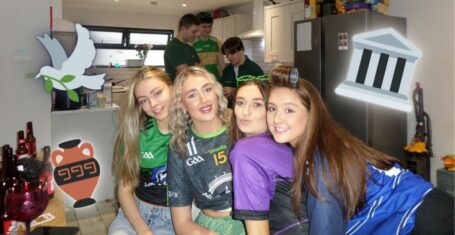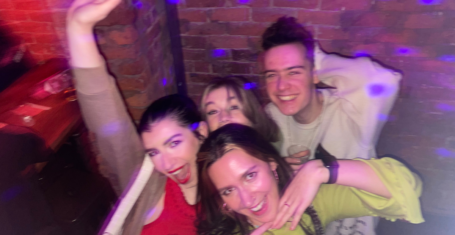
LJMU student was diagnosed with rare neurological disorder after thinking she had a hangover
‘I was in so much pain but I couldn’t scream – it was horrifying’
A Liverpool John Moore’s student woke up with a suspected hangover which turned out to be a rare neurological disorder.
In 2014, then criminology and psychology student Rachael Bailey suffered from what she thought was a “bad hangover” after a night out during freshers, but called 111 after completely losing sensation in her legs.
Rachael said she’d felt a tingling sensation in her legs the night before which she dismissed as the result of “wearing uncomfortable shoes” but her condition began dramatically decreasing the following day.
Rachael was airlifted from Liverpool to hospital and was diagnosed with Guillain-Barre syndrome, a rare neurological disorder which affects only one or two in every 100,000 people worldwide.
The disorder makes the immune system attack parts of the nervous system which leaves sufferers with pain in their limbs and paralysed.

Image credit: SWNS
Just three days after being airlifted to the hospital, Rachael’s condition decreased rapidly and she lost her ability to walk, speak and breathe and eventually fell into a medically induced coma whilst being supported by a ventilator.
“When I first woke up in hospital it was the worst thing I’d ever been through.
“I remember being angry and frustrated that my life had been snatched away from me.
“The first year was a nightmare, I hated every moment of it. Everything I had planned turned upside down and I felt lost.
“But it was also the best thing to ever happen to me- because I am who I am because of it.”
After spending 59 days in critical care followed by 76 days in rehabilitation, she managed to walk out of hospital on March 11 2015.
Rachael recalled the rehabilitation period as being “very intense.”
“For the first three weeks I hated everyone- I hated my situation and everyone around me”, Rachael said. “I cried every time I had to see a physiotherapist because it reminded me of everything. I really resented being there every day.
“I was in denial of how hard the recovery was going to be but the physios were amazing and helped me throughout.”
Rachael, from Nottingham, initially intended on returning to LJMU to continue her studies which she’d started in September 2014, but after her life-changing experience she switched to study physiotherapy at the University of Nottingham.
She described the staff who helped her recovery as “magicians” who inspired her to switch courses.
“They were like heroes and magicians – I thought what they did was simply incredible and inspiring.”
At the University of Nottingham, Rachael was coincidentally tutored by one of the physios who saved her life at the hospital. She got a first in physiotherapy in June this year and has landed her dream job at London’s Royal Brompton Hospital.
She said: “I’ve worked so hard, and it was so painful, but I’m so proud of myself.
“I’d never felt anger or pain like I did back then but it’s given me a new purpose in life.
“I can’t wait to start this new chapter of my life and help others the way I was helped.”

Image credit: SWNS
Whilst in Nottingham City Hospital’s neurological rehabilitation unit, Rachael remembers meeting a quadriplegic man who sat up and waved at her as she was leaving in March 2015.
“When I got there there was a quadriplegic man and when I left he sat up and waved at me – it was an incredible moment.
“I didn’t know much about physios, I thought they just helped footballers and massaged people.”
After Rachael’s diagnosis in September 2014, she was rushed into Queen’s Medical Centre in Nottingham after suffering from rare side-effects from the treatment which caused brain swelling and caused seizures.
“I didn’t think much of it,” recalls Rachael, who thought she’d just worn a bad pair of shoes and was suffering from a hangover. “Even after the diagnosis I was calm because I thought I was young and physically fit and I’d be home by the weekend.
“But I ended up spending nearly half of the year in hospital with tubes in my mouth, being spoon-fed and moving in a wheelchair.
“I didn’t know what was happening at all, I woke up and all I remember was asking one of the nurses to take a picture of me because I wanted to know what I looked like.
“It was terrifying because I was paralysed from my head to my toe and could only move some of my face.
“I couldn’t speak, I couldn’t move, I couldn’t scream.
“Only after the seizure did it really hit me how terrifying this all was- the fear and anxiety really set in.
“I was in so much pain but I couldn’t scream- it was horrifying.”
Rachael’s ability to walk again began after just three months since her diagnosis, something doctors describe as “miraculous” considering she was placed on a ventilator just three days after showing symptoms.
Features image credit: SWNS
Related stories recommended by this writer:
• Extinction Rebellion’s actions are ‘juvenile’, says Bristol Mayor
• 24-year-old male arrested following the toppling of the Colston statue
• The ‘rough sex’ defence is finally being banned









































